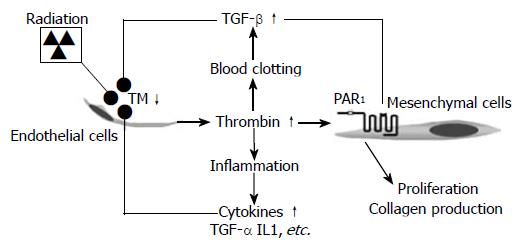Copyright
©2007 Baishideng Publishing Group Co.
World J Gastroenterol. Jun 14, 2007; 13(22): 3047-3055
Published online Jun 14, 2007. doi: 10.3748/wjg.v13.i22.3047
Published online Jun 14, 2007. doi: 10.3748/wjg.v13.i22.3047
Figure 3 Proposed model linking radiation-induced endothelial dysfunction to chronic inflammation and progressive intestinal fibrosis via chronic PAR1 activation.
Radiation causes TM deficiency in endothelial cells, leading to insufficient “scavenging” of locally formed thrombin. Thrombin exerts pro-coagulant, pro-inflammatory, mitogenic, and pro-fibrogenic effects on mesenchymal cells (smooth muscle cells, fibroblasts, and myofibroblasts), as well as other cell types in the irradiated tissue. Feed-back by cytokines and other inflammatory mediators sustains the endothelial TM deficiency and thus contributes to the chronicity of radiation injury.
- Citation: Wang J, Boerma M, Fu Q, Hauer-Jensen M. Significance of endothelial dysfunction in the pathogenesis of early and delayed radiation enteropathy. World J Gastroenterol 2007; 13(22): 3047-3055
- URL: https://www.wjgnet.com/1007-9327/full/v13/i22/3047.htm
- DOI: https://dx.doi.org/10.3748/wjg.v13.i22.3047









